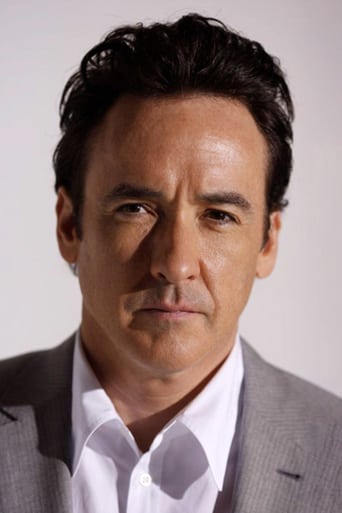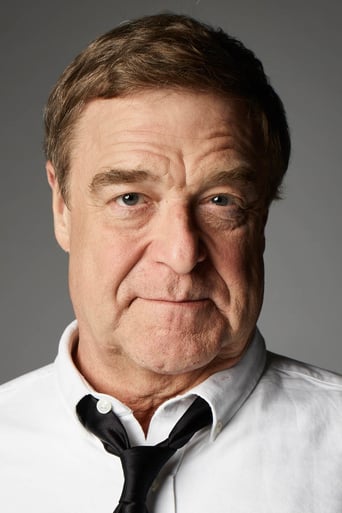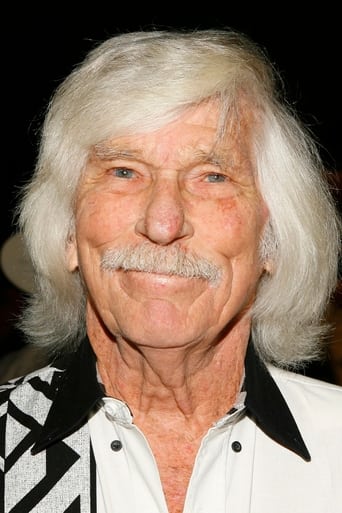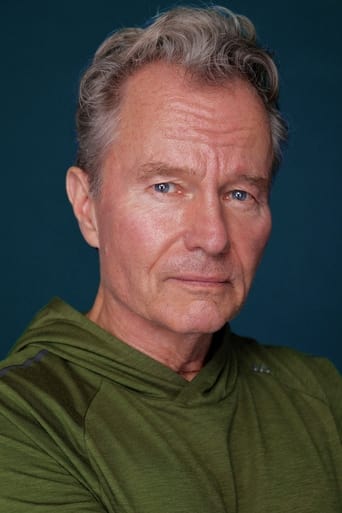Noutions
Good movie, but best of all time? Hardly . . .
AnhartLinkin
This story has more twists and turns than a second-rate soap opera.
Allison Davies
The film never slows down or bores, plunging from one harrowing sequence to the next.
Mathilde the Guild
Although I seem to have had higher expectations than I thought, the movie is super entertaining.
MBunge
Many modern Westerns take a whack at demythologizing the frontier, but I don't know of any other film that does it as powerfully and thoroughly as The Jack Bull. All the old, familiar themes are here, stripped of their pretense and given new and exciting life in a challenging tale that becomes more morally and ethically complex as it goes along.In the waning days of the Wyoming Territory, a horse trader named Myrl Redding (John Cusack) gets into a dispute with a land baron named Henry Ballard (L. Q. Jones) over two stallions. Myrl left them with Ballard as collateral for a toll to pass through Ballard's land on way to a horse auction. When Myrl returns for them, he finds his man left to mind the horses beaten and run off and the animals whipped, mistreated and worked near to death. Myrl demands the stallions be restored to the previous condition by Ballard's own hand, something the rich man sneeringly refuses.Myrl takes his case to the local judge (Ken Pogue), only to find him in Ballard's pocket. He tries to petition the territorial Attorney General, only to have that request end in tragedy. Unwilling to let the wrong done him go unanswered, Myrl gathers together a gang of men and rides up to Ballard's spread to get justice for himself. Ballard escapes, however, leaving Myrl to lead his men across the countryside, threatening to burn out anyone who gives aid or shelter to Ballard. This little insurrection eventually brings the conflict between Myrl and Ballard to the attention of the territorial governor (Scott Wilson), but not until people are killed and someone has to be help accountable for those deaths.Myrl Redding deserves to stand alongside Tom Doniphon and Liberty Valance in the pantheon of Wild West cinema. All three symbolize how the sort of men who made the frontier the glorious place it was, were also the sort of men who would have no place as the frontier gave way to civilization. Make no mistake, Henry Ballard is the bad guy in this story and Redding is the good guy. But most of Ballard's actions are legal and only slightly unethical. The crimes he does commit are of a petty nature. The awful events of The Jack Bull flow not from the greed or arrogance of Henry Ballard, but from the uncompromising pride and independence of Myrl Redding. Ballard makes only a little spark. It is Myrl who pours gasoline on that spark until it becomes a deadly fire.Taking the law into your own hand when you're denied justice is one of the oldest Western stories. The Jack Bull is one of the few that recognizes when you take the law into your own hands, it's like setting yourself alone in a boat across the ocean. You have nothing but your wits and your will to deal with all the forces that come against you and decisions and actions that seem right can have disastrous consequences. A corrupt justice system fails Myrl Redding, but no justice system can withstand men who pursue their own righteous satisfaction to the exclusion of all else.In addition to being smart and compelling, The Jack Bull has a marvelous cast. Strong performances abound, particularly Scott Wilson and John Goodman as another territorial judge who is committed to seeing justice done to its fullest extent. John Cusack is tremendously effective, never letting what Myrl Redding represents overwhelm the character's simply humanity. And Director John Badham does an excellent job at capturing the extremes which lived side by side in the dying days of the Wild West.The Jack Bull is an outstanding movie and is a must see of the modern Western.
H. Martin (~AleXa~)
This is an HBO original movie, but let me assure you this is of the caliber to have been a theatrical release. This film makes a powerful statement about the importance of standing up for what you believe in and how you cannot just say what is right, but have the courage to take action when words fail you and see justice done, whatever the cost.The setting is the beautiful mountains and frontier country of pre-statehood Wyoming; the man is Merle Redding (John Cusack), a simple horse trainer just trying to earn a living for him and his family; the problem is a wealthy cattle rancher named Henry Ballard (L.Q. Jones) buying up all the land between the homesteads and the nearest town. Conflict arises when Merle is taking some of his horses to town to sell at the auction and needs to pass through Ballard's new spread of land—previously unowned—as it is the only way to make it to the auction on time. And that is all I will say so as to not spoil any critical elements of the movie. The first thing that stands out about the film is that the scenery is absolutely breathtaking. I could've done without the filters, but the sights are still something to behold. The actors are well-cast; John Cusack and John Goodman really shine in their respective roles. The screenplay (written by Dick Cusack, John Cusack's father) is well-thought out and succeeds in making the film come full circle. The characters are three-dimensional and the audience can easily relate to their individual struggles. As well, the parallel editing between Cusack's 'circumstance' and the parade for Wyoming's official statehood speaks volumes...very eloquent indeed.This film should be a lesson to all of us to remember what's important and fight for what we believe in. We cannot settle for simply saying what is right and what should be done, but stand behind what we say. It reminds us to fight for the little guy and that one person *can* make a difference.VERDICT: A moving film about true conviction of the heart; truly inspiring. Hands down one of the best westerns I've ever seen (which is a lot). On that note, if you don't like westerns, this probably isn't the film for you, but otherwise, it's a must-see.8.5 out of 10.0NOTE: To anyone who loves horses, this film will hit a particular soft spot in your heart—it certainly did for me
oshram-3
I'd never even heard of this film – apparently it was done for HBO a while back – but it was a John Cusack film I'd never heard about, and to me he's an interesting enough actor that I'll try something blind for his sake.Jack Bull is set in the 1870s; Cusack plays horse rancher Myrl Redding, an honest man trying to make an honest living on his Wyoming farm. Unfortunately he crosses paths with local tycoon Henry Ballard (L.Q. Jones), who decides to give Redding a hard time and mistreats some of his prize stallions and one of his Native American workers. When Redding demands justice, of course he finds the deck stacked against him, so he takes the law into his own hands.Jack Bull, while a compelling story, is also an examination of the concept of 'natural' law vs. civil law, and poses some questions about just how much of a right we have as men to be treated fairly no matter the circumstances. The story could have been a moralistic whitewash, but by making Myrl less than perfect the movie aims a lot higher, with satisfactory but occasionally unsettling results. It would be easy to just take the side of the little man against the big rich fella (like they did in, say, Silver City) and here it's not hard to do that. But Myrl's complexity and his occasional slips – he's no saint, though he tries hard to do no damage to the innocent – render this story in much darker, richer colors than lesser hands would have.Cusack is excellent here, as he usually is. His uncompromising performance as Myrl dominates the picture, and Cusack displays the man's drive and determined nature without ever overdoing it or descending into melo-drama. Most of the rest of the cast is fairly strong as well (I particularly enjoyed Scrubs' John C. McGinley's turn as simple sidekick Woody), with a standout turn by John Goodman as a dedicated lawman named Judge Tolliver. The end trial, as a result, is a powerful capper to a movie that questions moral choices throughout.Though a darker film, Jack Bull is an excellent piece, with well thought-out characters, motivation, and execution. It offers no easy answers, though it does conclude its story with finality, and in the end only reinforces that the consequences we suffer are a direct result of the actions we take. This one may be a little hard to find (I got it from Netflix), but it's certainly well worth the search.
secho
** Spoilers**Oh but I'm angry. Based on a true story or not, there's absolutely no reason for the last twenty minutes of this movie - a melodramatic hanging of its hero (some say `antihero') that does little more than leave audience mouths agape. I, myself, felt both sickened and incredulous by the almost fetishistic manner in which the movie dealt with the hanging. First there is this whiny buildup of tension. Will he be hanged? Won't he be hanged? Then the sad and dismayed son is trotted out like some kind of token ornament to provoke sympathy from the audience. As the scene tiredly plays out, everything and I mean everything seems to point to the inherent justice in sparing the condemned man's life. We demand that someone save him. But in the end, what happens? He is of course hanged -- in an orgy, I might add, of tear-jerking music and slow motion camera work. I don't mind an unconventional ending, but give me a break at least. Don't draw the thing out. The only explanation I can see for this ending is that the writers truly did not care about the audience. Whatever point was trying to be made here about the occasional unfairness of the law, taking responsibility for your own actions, and standing up for what you believe in was lost on me. And don't tell me that every movie doesn't have to have a happy ending. Yeah, no kidding, so then don't manipulate your audience to expect one. That's just bad film making.





